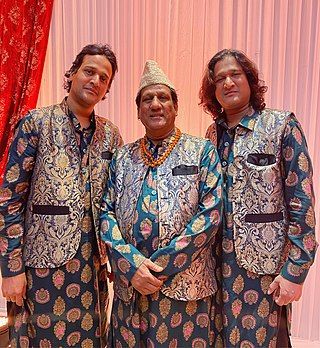Related Research Articles

Abdul Rashid Salim Salman Khan is an Indian actor, film producer, and television personality who works predominantly in Hindi films. In a career spanning over three decades, Khan has received numerous awards, including two National Film Awards as a film producer, and a Filmfare Award as an actor. He is cited in the media as one of the most commercially successful actors of Indian cinema. Forbes has included Khan in listings of the highest-paid celebrities in the world, in 2015 and 2018, with him being the highest-ranked Indian in the latter year. Khan has starred in the annual highest-grossing Hindi film of 10 individual years, the highest for any actor.

The Sabri Brothers were a musical band from Pakistan who were performers of Sufi qawwali music and were closely connected to the Chishti Order. They are considered one of the greatest Sufi qawwali singers of all times. The Sabri Brothers were led by Ghulam Farid Sabri and his brother Maqbool Ahmed Sabri. They are often referred to as Shahenshah-e-Qawwali and are also known as the roving ambassadors of Pakistan. The band was initially founded by Maqbool Ahmed Sabri at the age of 11 years and was known as Bacha Qawwal Party. His elder brother Ghulam Farid Sabri joined after insistence from their father. He became the leader of the group and the band soon became known as the Sabri Brothers. They were the first-ever qawwali artists to perform qawwali in the United States and other Western countries; they were also the first-ever Asian artists to perform at New York's Carnegie Hall in 1975.
Allah Hoo is a traditional Sufi chant (dhikr) consisting of the word for God run together three times, followed by Truth (haqq): Allāhu Allāhu Allāhu Haqq, itself repeated three times over. According to Sufi tradition, this formula was introduced by Abu Bakr as he initiated the Naqshbandi tradition. Other Dhikrs consist of simple Allāhu Allāhu run together 400 or 600 times.
Aziz Mian Qawwal was a Pakistani traditional qawwal famous for singing ghazals in his own style of qawwali and is considered one of the greatest qawwals in South Asia. He holds the record for singing the longest commercially released qawwali, Hashr Ke Roz Yeh Poochhunga, which runs slightly over 150 minutes and. Aziz is known by sobriquets — "Shahenshah-e-Qawwali", "Fauji Qawwal"(Military Singer) since his early performances were often in army barracks, and "the Nietzschean qawwal".

Adnan Sami Khan is an Indian singer, musician, music composer, actor and pianist. He performs Indian and Western music, including for Hindi and Telugu. He has been awarded with Padma Shri for his remarkable contribution in music. His most notable instrument is the piano. He has been credited as "the first musician to have played the santoor and Indian classical music on the piano". A review in the US-based Keyboard magazine described him as the fastest keyboard player in the world and called him the keyboard discovery of the nineties.

Kabir Khan is an Indian film director, screenwriter and cinematographer who works in Hindi cinema. He started his career working in documentary films, and then made his feature film directorial debut in 2006 with the adventure thriller Kabul Express. He is best known for directing Ek Tha Tiger (2012) and Bajrangi Bhaijaan (2015). His latest film 83 was released in 2021.

Ghulam Farid Sabri was a qawwali singer and member of the Sabri Brothers, a qawwali group in Pakistan in the 1970s, 1980s and 1990s. The Sabri Brothers received the Pride of Performance award by the President of Pakistan in 1978. Sabri was also a Sufi mystic connected to the Chishti Order.
Aaj Rang Hai also known as Rang or Rung (transl. Color) is a Qawwali written by the 13th-century Sufi poet, Amir Khusrau in Hindavi and Braj Bhasha dialects. In the song, Khusrau describes to his mother his ecstasy upon finding his murshid in the Sufi saint Nizamuddin Auliya. The song is a staple of most Qawwali sessions in North India and Pakistan, especially in the Chishti shrines of Delhi. It is traditionally sung as a closing piece at the end of a Qawwali session.
Dama Dam Mast Qalandar is a spiritual Sufi qawwali written in the honour of the most revered Sufi saint of Sindh, Lal Shahbaz Qalandar (1177–1274) of Sehwan Sharif. The origins of the poem is unknown, since no recordings or written documents exist mentioning it prior to the 1950s. However, legends around the Shrine of Lal Shahbaz Qalandar in Sehwan suggest that the original poem was initially written by the 13th-century Sufi poet Amir Khusrow, then further modified by Bulleh Shah in the 18th century. The poem includes a reference to the town of Sehwan, and the word "Lal" can refer to Lal Shahbaz Qalandar as a young man, his legendary ruby glow, or his red dress. Bulleh Shah gave an entirely different color to the qawwali, adding verses in praises of Shahbaz Qalandar and giving it a large tint of Sindhi culture. It also venerates Ali, the cousin and son-in-law of prophet Muhammad.
The Producers Guild Film Award for Best Male Playback Singer is given by the producers of the film and television guild as part of its annual award ceremony to recognise the best Indian film of the year. Following its inception in 2004, no one was awarded in 2005 and 2007.

Maqbool Ahmed Sabri was a Pakistani qawwali singer and a prominent member of the Sabri Brothers, one of the greatest qawwali groups of all times which belonged to Pakistan. The Sabri Brothers were honoured with the Pride of Performance Award in 1978.

Koduri Viswa Vijayendra Prasad is an Indian screenwriter and film director who predominantly works in Telugu cinema. He also worked in a few Hindi, Kannada, and Tamil films. His filmography consists of more than twenty five films as a screenwriter, most of which were commercially successful.

Nizami Bandhu are an Indian musical group composed of Ustad Chand Nizami, Shadab Faridi and Sohrab Faridi Nizami.
Kausar Munir is an Indian lyricist and screen writer in Bollywood.

Bajrangi Bhaijaan is a 2015 Indian Hindi-language comedy-drama film co-written and directed by Kabir Khan, based on an original story by screenwriter V. Vijayendra Prasad, and produced by Salman Khan, Rockline Venkatesh and Kabir Khan. The film stars Salman with debutante Harshaali Malhotra, Kareena Kapoor Khan and Nawazuddin Siddiqui, and tells the story of Pawan Kumar Chaturvedi, a devotee of the Hindu deity Hanuman, who embarks on a journey to take a mute six-year-old Pakistani Muslim girl Shahida, separated in India from her mother, back to her hometown.

Harshaali Malhotra is an Indian actress and model who works in Hindi films and television series. She is best known for her role as Munni in Kabir Khan's drama film Bajrangi Bhaijaan (2015) which earned her nomination for a Filmfare Award for Best Female Debut.
Mohammed Musa Hashmi, known by his pen name Purnam Allahabadi was an Urdu poet and lyricist, best known for his worldwide famous Qawwali Bhar Do Jholi Meri Ya Muhammad sung by Sabri Brothers and Tumhe Dillagi originally sung by Nusrat Fateh Ali Khan.

Ravi Khanna is an Indian actor, journalist and writer.

Bajrangi Bhaijaan is the soundtrack to the 2015 Indian Hindi-language comedy-drama film of the same name directed by Kabir Khan from an original story written by V. Vijayendra Prasad, starring Salman Khan, Harshaali Malhotra, Kareena Kapoor Khan and Nawazuddin Siddiqui. The film's soundtrack features eleven songs: with seven original, three reprises and an alternative version. All those songs were curated and composed by Pritam and written by Amitabh Bhattacharya, Shabbir Ahmed, Kausar Munir, Mayur Puri, Neelesh Misra and Badshah. The soundtrack was released by T-Series on 17 June 2015.
References
- ↑ "Amjad Sabri dead: Top 7 qawwalis of Sabri Brothers to pay tribute to the Sufi music icon". India.com. 2016-06-22. Retrieved 2023-08-19.
- ↑ "Salman Khan's Bajrangi Bhaijaan song Bhar Do Jholi Meri copied from old Qawwali". India.com. 2015-06-25. Retrieved 2023-08-19.
- ↑ "Watch 'Bhar Do Jholi Meri': Salman Khan's favourite 'Bajrangi Bhaijaan' song". The Indian Express . 2015-06-25. Retrieved 2023-08-19.
- ↑ Developer, Web. "Watch: 'Bhar Do Jholi Meri' song from 'Bajrangi Bhaijaan'". Mid-day. Retrieved 2023-08-19.
- ↑ "Bajrangi Bhaijaan song Bhar Do Jholi Meri: This is Salman Khan's first ever Dargah song!". India.com. 2015-06-25. Retrieved 2023-08-19.
- ↑ "Salman Khan unveils the first look of 'Bhar Do Jholi Meri' song from 'Bajrangi Bhaijaan'". Times of India . Retrieved 2023-08-19.
- ↑ "Pak singer Adnan Sami is an Indian citizen now". Hindustan Times . 2015-12-31. Retrieved 2023-08-19.
- ↑ "Adnan Sami features in 'Bajrangi Bhaijaan' song". Gulf News . 2015-06-26. Retrieved 2023-08-19.
- ↑ "Adnan Sami: I couldn't give time to music as I was busy with citizenship formalities". Hindustan Times. 2017-06-28. Retrieved 2023-08-19.
- ↑ Desk, Entertainment (2015-07-10). "EMI Pakistan sends legal notice, bars use of 'Bhar Do Jholi' in Bajrangi Bhaijaan". DAWN . Retrieved 2023-08-19.